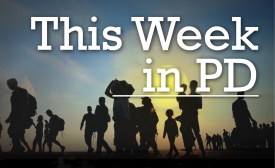international NGOs

PD News headlines focused on the role of public diplomacy in empowering vulnerable populations.
A local women’s rights advocacy group has teamed up with an international foundation in a three-year programme to reach out to victims of domestic violence in the city. That includes new arrivals from the mainland, the lesbian community and young students who suffered from what was called “dating violence”, said Linda To Kit-lai, founding member and executive director of HER Fund, a Hong Kong-based non-governmental organisation.
We write on the occasion of the forthcoming 13th Australia-Vietnam human rights dialogue, scheduled to be held in Vietnam in August 2016. Australia should raise pressing human rights issues in an unambiguous manner, set clear benchmarks for improvements, and make the outcome of the discussions public.
In late 2015 and early 2016 a series of 39 training courses were organized all over Mexico by UN Women in partnership with five civil society organizations, including Centro de Derechos Humanos Fray Matías de Córdova [...[ I.A.P. The trainings in the southern border area brought together local organizations, migrant women and civil servants to discuss ways to address migration, gender and development.
How is democracy promoted around the world? What techniques are successful? Established state democracies are by no means the only inspiration for democracy or for good governance; these ideas can find inspiration in other cultures and societies, such as Myanmar.
The NGO campaigns, led by Human Rights Watch and Amnesty International, are vital in this process. The problem is that journalists, academics, diplomats, political leaders, and Western officials frequently quote these usually uncorroborated accusations in condemning Israeli policies, “reflecting the ‘soft power’ of these NGOs acting to reinforce the Palestinian narrative and the objectives of the OIC.”
“The Global Village encourages social sustainability, world awareness, and cultural understanding. [...] It revives the general concept of the world being a ‘global village’ and inspires people to understand and appreciate the uniqueness and differences of each other, which further contributes to peace."
[The Halo Trust] began operations in Mozambique in 1993, funded by the US, UK and others to the tune of nearly $57m (£37m). Calvin Ruysen, regional director of Halo in southern Africa, said: “This is the first heavily mine-affected country to reach an end state. That’s a massive story because it demonstrates that, with the right approach and resources, you can bring a problem to conclusion. It’s an example to other heavily affected states: the fact we’re here now is very important.”







